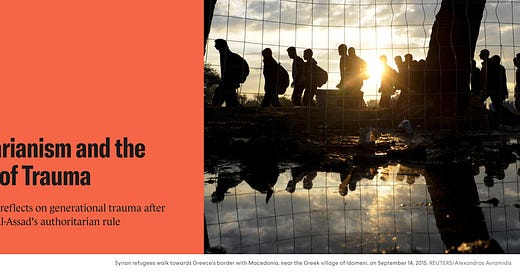My favorite part of being a professor is working with people who teach me a great deal. Working with Diana Rayes over the past year has been exactly that. She is brilliant, driven, and brings with her a mosaic of experience—both lived and learned. Part of her postdoc has been beginning to write a book that weaves together her personal story with her intellectual journey. She has worked extensively with Syrian refugees who were displaced to countries in the Middle East, Europe, and the United States, investigating how people manage the trauma of their past with current struggles in everyday life living in a new context and trying to get by. She writes about this story in Think Global Health, which was published this morning. If you have a moment, it’s worth a read. I’ve pasted the intro below.
Excerpt from her piece in Think Global Health.
Only after the collapse of the Assad regime did I begin to reckon with the idea that I could have inherited my family's trauma.
My father was 17 when he arrived in Chicago in April 1979—one of the first in his generation of Syrian men who fled his hometown of Hama amid a brewing crisis. Three years later, an uprising and attempted coup by the Muslim Brotherhood against the Hafez al-Assad regime resulted in a deadly massacre with estimates of up to 40,000 killed—nearly 10% of the city's population—mostly men who were accused of being affiliated with the Muslim Brotherhood. To this day, the Hama massacre (or the "events of Hama" as it came to be referred to ambiguously by residents) is still considered the worst massacre by a government against its people in modern Middle Eastern history…..
My mother, 9 years old at the time, was inside the city of Hama. She and her family managed to evacuate the city only because her brother—a medic in the local hospital—realized early on that trouble was brewing when he saw mass numbers of patients killed with bullets. Fearing for their lives, my mother and her family escaped to the countryside in an ambulance. These memories, long forgotten and buried in silence, remain central—not only to my parents' stories, but to mine as well. They carry the weight of what was lost and what could have easily been a more tragic fate for my family.
As a social scientist who studies mental health, I have long been interested in how trauma is inherited and etched into our bodies. My professional journey to the field of global mental health was driven by a search for understanding. It was not until my first psychology class in college that I began to grasp how little I knew about the traumas that lingered in my family because of their displacement story and subsequent immigration to the United States, and how deeply these unspoken experiences had shaped us all.



